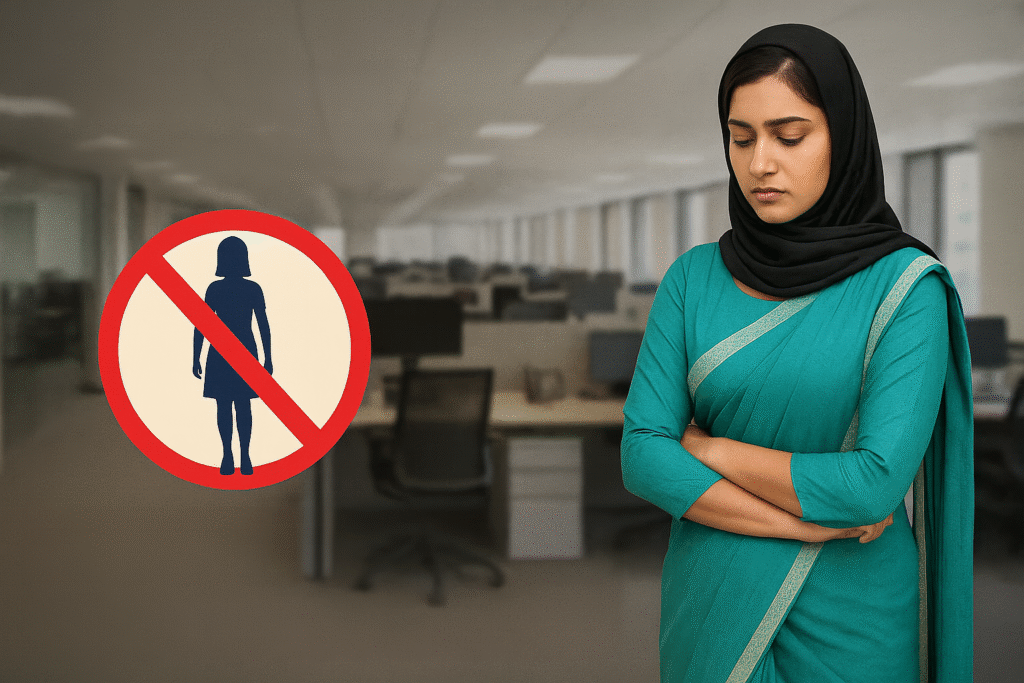Bangladesh Bank has recently issued a new dress code for all levels of its officials and employees, igniting widespread public debate across the country. The directive, which specifically prohibits short sleeves, short-length dresses, and leggings for female staff, has drawn significant criticism from various quarters. The instruction, issued on 21 July 2025 by the bank’s Human Resources Department-2, aims to ensure a “professional and modest workplace environment.”
Dress Code Guidelines for Male and Female Employees
According to the directive, male officials and employees must wear formal shirts (either long or short-sleeved), formal trousers, and formal shoes or sandals. Wearing jeans and gabardine trousers has been explicitly prohibited.
Female officials and employees have been instructed to wear saris, salwar-kameez with scarves, or other professional and modest outfits in simple and professional colors. Additionally, formal footwear and plain headscarves or hijabs are suggested. The directive strictly bans short-sleeved and short-length dresses as well as leggings.
Conduct, Discipline, and Oversight
Item 11 of the dress code includes three supplementary instructions:
- 11(a): Emphasizes compliance with Section 39 of the Bangladesh Bank Staff Regulation 2003, concerning behavior toward female colleagues. It states that any complaints regarding sexual harassment must be submitted to the designated committee within 30 working days of the incident.
- 11(b): Reiterates the requirement to adhere to existing official guidelines on social media usage issued by Human Resources Department-2.
- 11(c): Highlights the importance of maintaining office decorum through honesty, punctuality, discipline, responsibility, mutual respect, and a collegial environment.
Item 12 of the directive mandates that each office, division, project, or unit must appoint an officer to monitor compliance with the dress code. Any violations must be reported to the department head, who will then file formal disciplinary charges.
Bangladesh Bank’s Official Position
Speaking to the media, Bangladesh Bank’s Executive Director and spokesperson Arif Hossain Khan stated that the goal is to promote uniformity and decency in attire within the institution. He emphasized that the directive took effect from 21 July and clarified that while hijabs are not mandatory, those who choose to wear them must use plain-colored ones.
Khan added that most employees already dress appropriately, but the directive was introduced following behavioral observations among recently recruited university graduates. According to him, many of these new recruits still display casual attitudes common in academic settings, prompting the bank to formalize workplace attire expectations. He also noted that the dress code applies only within office premises and does not restrict individuals’ choices in personal settings.
Public Response and Criticism
Since its release, the directive has drawn widespread criticism, especially on social media. Feminist groups and human rights activists have questioned the logic and necessity of regulating women’s clothing in a professional environment.
Fawzia Moslem, President of Bangladesh Mahila Parishad, told the media that she found the directive both surprising and unnecessary. “Do women wear indecent clothes at a place like Bangladesh Bank?” she questioned. According to her, the move appears to be part of a broader cultural agenda aimed at imposing a restrictive social framework.
She further commented, “Bangladesh Bank has hundreds of important responsibilities. Was deciding what to wear really a priority? The focus should have been on whether officials are fulfilling their professional duties effectively.”
Administrative Background
The directive emerged from a regular agenda item discussed in a monthly meeting of Bangladesh Bank’s Benefits and Administration Wing (Human Resources Department-2). The discussion led to a formal decision aimed at ensuring modest and professional attire in light of social norms. This decision was subsequently implemented as an official instruction.
Analysts argue that this directive conveys an implicit message: workplace performance is being evaluated not on merit or competence, but based on how employees dress. Such a stance, they warn, risks setting a troubling precedent in a professional institution.
Publication Date: 23 July, 2025
Reports published in various newspapers on this issue: ittefaq, channelionline, banglanews24,
kalerkantho, dhakapost, prothomalo
এই আর্টিকেলটি বাংলায় পড়তে চাইলে এখানে ক্লিক করুন







